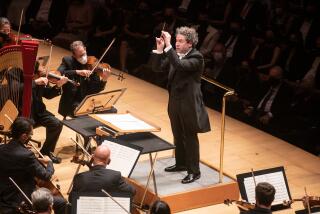Guarneri String Quartet and Johannes String Quartet at the Samueli Theater
Were it a car, the Guarneri String Quartet would be a 1964 Rolls Royce Silver Cloud III. Only so luxurious a touring vehicle can serve as an analogy to an ensemble with an ultra-plush, million-dollar tone. It has to be a tasteful Rolls, moreover, not some cream-colored, two-toned number, and one in perfect condition and utterly reliable even after 45 years on the road.
Still, the day comes when the garage calls. The Guarneri, formed by young men at the 1964 Marlboro Music Festival in Vermont and by now the subject of books and films, has embarked on its last season.
Last month, the Guarneri opened the Coleman Concerts at Caltech with a pair of late Beethoven quartets. The series was formed in 1904, so that might have been one way for a venerable ensemble to feel young. But for its appearance Wednesday night at the Samueli Theater of the Orange County Performing Arts Center, the quartet actually embraced youth.
As part of its farewell, the Guarneri is touring with far younger colleagues, the members of the Johannes String Quartet. Each ensemble programmed a new work written for it. William Bolcom was commissioned to write an octet for all the players, who also come together for Mendelssohn’s Octet.
Sadly, tragedy struck Tuesday. The brother of Johannes violist Choong-Jin Chang died unexpectedly, and Chang flew immediately to South Korea. A substitute violist, Leslie Robertson of the St. Lawrence Quartet, filled in for the Mendelssohn. But the West Coast premiere of Esa-Pekka Salonen’s “Homunculus,” for which OCPAC was a commissioner, had to be scrapped, as did Bolcom’s Octet: Double Quartet. The Guarneri was still able to give the West Coast premiere of Derek Bermel’s “Passing Through,” and it pulled Dvorák’s “American” Quartet out of its very large repertory hat to fill out the program.
“Passing Through” is a curious reverie. Bermel, born in 1967, three years after the Guarneri was formed, said in the program note that he composed his brief (just over six minutes) quartet last year at New York’s Copland House, Aaron Copland’s longtime residence. He was surrounded by American music history, and his subject was a quartet that has played its own significant role in American music history. Endings are his beginnings. He passes, in this score, through the slow movement of Beethoven’s last quartet, Opus 135.
More accurately, Bermel, who is also a clarinetist with a feel for jazz, swings through the Andante. Were the Guarneri not such a non-nostalgic foursome, this could come off as a slightly sentimental gesture. But the quartet’s violist, Michael Tree, told the San Francisco Chronicle last week that the decision to disband was made with little discussion and no looking back. Displays of temperament are not conducive to longevity such as theirs. Bermel’s lovely score proved a pleasant meditation on Beethoven, no more and no less.
Dvorák’s “American” was deluxe. Three of the members -- violinists Arnold Steinhardt and John Dalley as well as Tree -- are originals. They read one another’s minds. Peter Wiley, who joined the ensemble in 2001, was a student of founding Guarneri cellist David Soyer. Fault, if you wanted to look for it, could be found in violin intonation here and there. The reading was less fleet than a group of sleek hotshots just out of the conservatory would offer.
But what beauty the Guarneri commands. The ensemble operates on the pleasure principle, namely by making the listener comfortable. A temptation to doze is the downside, but even then you’ll awake in the best aural surroundings imaginable and think you’ve died and gone to heaven.
Johannes violinists Soovin Kim and Jessica Lee and cellist Peter Stumpf (also principal cellist of the L.A. Philharmonic) took the first chair parts for the octet. Mendelssohn wrote this score at 16. Some say it is his best work (he called it his favorite). Some say it is the best piece of music ever written by a 16-year-old. I certainly can’t think of an instance of youth being better captured by youth. Kim looked as if he was having the time of his life, and he sounded that way too. Everyone followed his lead, while the Guarneri players added a solid foundation and acres of stuffing to fill a room 10 times the size of the intimate Samueli. If the Guarneri is all about pleasure, the Johannes’ calling card is joy.
An OCPAC spokesman said the center hoped to bring the Johannes back either later this season or next to play the new Salonen score. Meanwhile, these performers will appear Saturday at UCLA, most likely again without the Salonen or Bolcom.
More to Read
The biggest entertainment stories
Get our big stories about Hollywood, film, television, music, arts, culture and more right in your inbox as soon as they publish.
You may occasionally receive promotional content from the Los Angeles Times.







